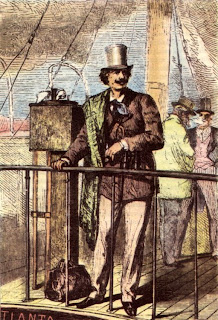When I was a tender young lad my favorite authors were Jules Verne and H. G. Wells.
These guys represent two different approaches toward science fiction. Verne took a more technological approach. He looked at technological trends and wrote about cool scientific inventions that would in turn serve a central role in the story: submarines, space guns, and airships for example.
Conversely, Wells took a more sociological approach. He looked at historical trends and wrote about the cultures likely to arise from them. The "Upstairs/Downstairs" class stratification of Victorian society would likely drive human evolution to elf-like Eloi and troll-like Morlocks.
If you look at any science fiction story, you can gauge how much Verne and how much Wells is in the story. When I speak of the line between Fantasy and Science Fiction, it's a lot easier to start with a Verne-style story and prove it is not Fantasy than to do so with a Wells-style story.
As a friend recently pointed out to me, "Science Fiction gets bogged down in telling you how the watch works, Fantasy just tells you the time and moves on." I heartily agree when you're talking about a Verne-style story. Less so with a Wells-style story.
Granted, we never read detailed technical specifications for the power plant of the Nautilus, but Verne provided details like the electric guns being powered by Leiden jars (super-capacitors). In contrast, Well's time machine had a lever and an odometer that showed what year it was.
Could "20,000 Leagues Under the Sea" be retold as a Fantasy story? I don't see how it could--you really need the submarine. Feel free to prove me wrong.
Conversely, could "The Time Machine" be told as Fantasy? Maybe. The gist of the story is that the time traveler goes to someplace different where the Morlocks (who keep everything working) terrorize the Eloi (who do lunch).
I think I could write a story where a magic-user casts a spell and lands in Middle Earth with dwarfish Morlocks and elvish Eloi doing everything the same as in The Time Machine. The biggest thing lost in such a translation would be Wells' sermonizing about how evil and destructive war is. We really don't need the sermonizing as long as there are pictures of Hiroshima available.
I've elsewhere suggested that there's good reason to classify the stories of Finding Time under fantasy, since the science of chaos theory causes a lot of trouble for ANY time travel scenario. And quantum mechanics implies that you cannot even OBSERVE quantum systems.
Nevertheless, I love science and technology too much to not give inventions a prominent role in my stories. I feel an unstoppable need to tell the reader how the watch works. Consider my story, "Sealed Was The Tomb" wherein Sid is testing a time machine. I show a spaceship going to Epsilon Eridani and the story turns on the need to maintain an UNOBSERVED quantum system. (Is there sociology in the Spacer/Lubber conflict? Yes, but that's another story.)
This makes Finding Time Science Fiction.




No comments:
Post a Comment